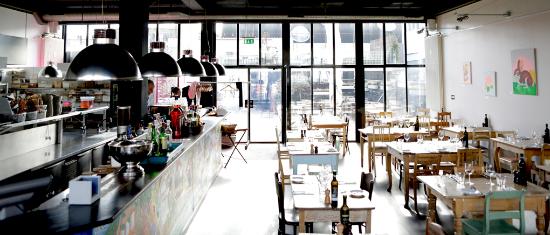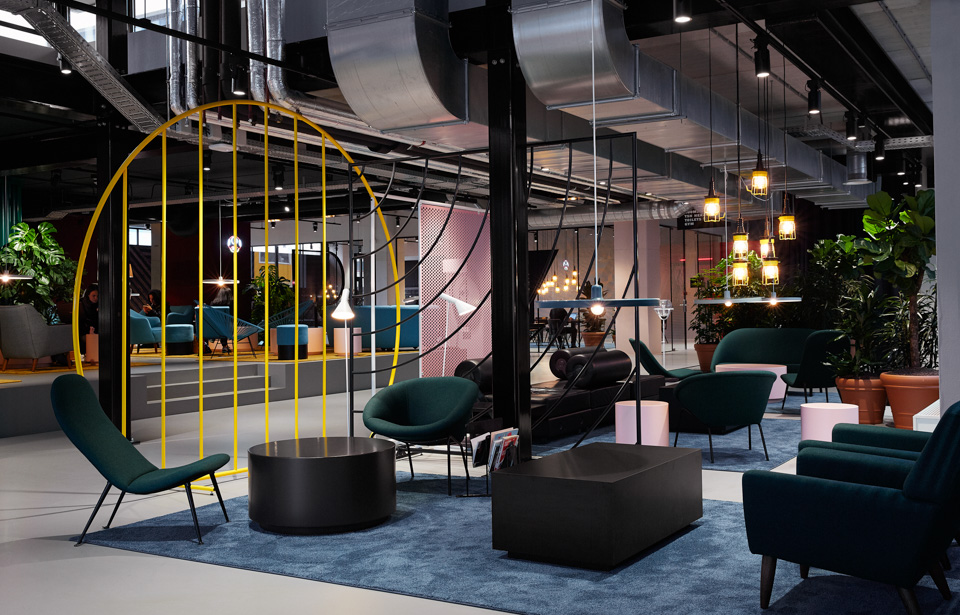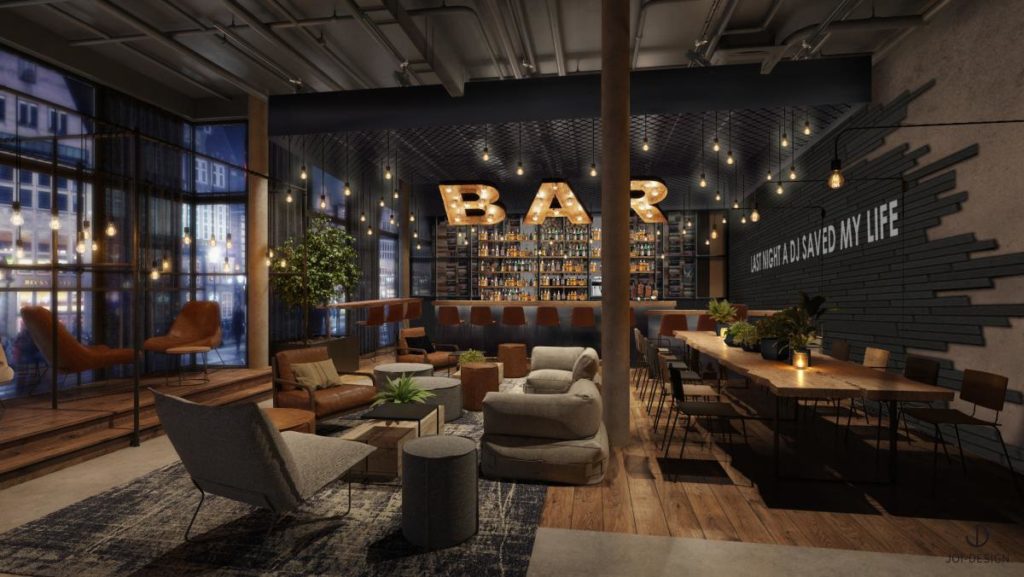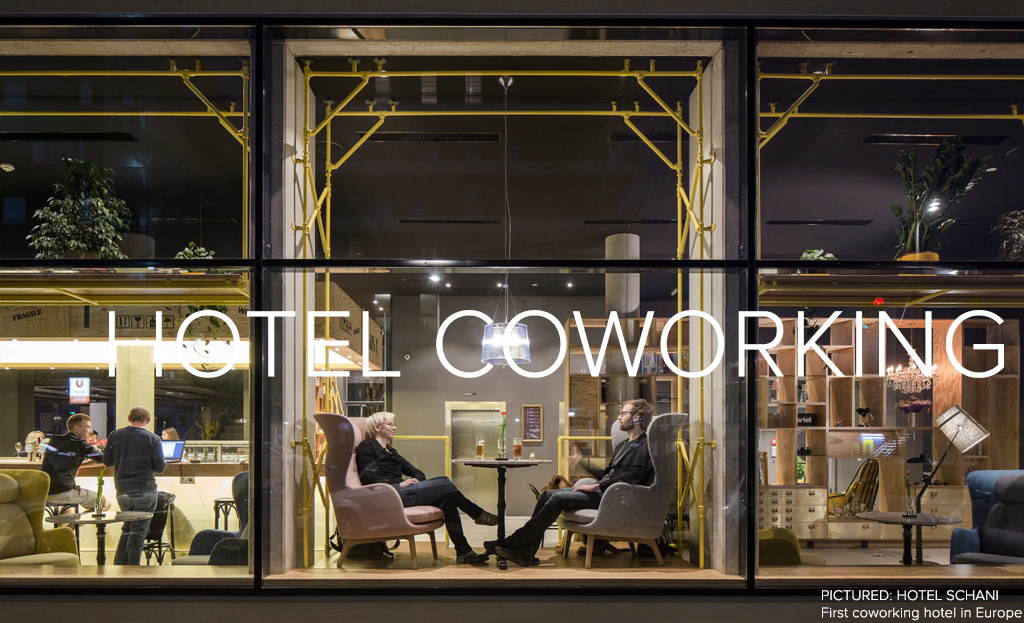
Lea-Sophie Zwoch, Consultant at mrp hotels

Olaf Steinhage, Partner at mrp hotels
mrp hotels is a hospitality consulting firm with long-time experience in the global hotel and real estate industries. The company has offices in Vienna, Berlin, Amsterdam, Luzern and Istanbul. We have interviewed Olaf Steinhage and Lea-Sophie Zwoch, both authors of the recently released industry report “Coworking: How hotels can add relevant value to the coworking market” to learn more about their thoughts and ideas regarding the coworking segment within the hotel and accommodation market.
Hello Lea-Sophie and Olaf. Why are hotels becoming good candidates to provide coworking services?
Coworking spaces share similar characteristics with the segment of what we call “city hotels”. Hotels are located near city hubs and transportation hotspots. They provide with one form of concierge / customer service. They offer food and drinks to business travelers and possess large open spaces with a good WIFI infrastructure. Ultimately, hotels and their lobbies are left empty during the day, usually from 9am to 5pm. These areas could be used much more efficiently by providing benefit for the hotel operator as well as to the hotel guest by adding coworking possibilities.
Hotels and their lobbies are occupied mainly before 9 am and after 5 pm. With other words, those areas are left empty during the day.
Shall we expect all hotel categories to soon offer coworking services?
It does not matter which category the hotel belongs to as long it has enough “leftover” space that can be used as a coworking spot or can be transformed into a working space during the day. Presumably, mainly three- or four-stars hotels would integrate a coworking concept in their lobby or MICE related areas. Two-stars hotels usually do not have enough spare space whereas five-stars hotels follow a different concept by serving a different customer group. In fact, it is important that the hotel concept and design fits with the original idea and with the coworking lifestyle. As stated in the article, coworking concepts are appalling due to their modern and charming design and inspiring atmosphere. A classic five-stars hotel such as for example the Atlantic, Four Seasons or Regency Hotels would probably not be the right candidates for implementing a coworking space. Hotel coworking spots would probably be located in an IBIS, Intercity or H-Hotel, for example. Of course, Boutique hotels and lifestyle-oriented hotels also promise much more potential regarding the integration of the coworking concept.
Presumably, mainly three- or four-stars hotels would integrate a coworking concept in their lobby or MICE related areas. Boutique hotels and lifestyle-oriented hotels also promise much more potential regarding the integration of the coworking concept.
Catering coworkers or hotel guests, though, require different set of skills and different approaches…

Tribeca NV Restaurant in Copenhagen turned into an office during the day
At first glance it may look like this. Maybe because they have developed in different times and/or different environments. However, as mentioned in the report, about 20 years ago, by designing an architecturally impressive lobby, offering communal tables, outlets, a all-day bar and restaurant or free WiFi, hotels managed to turn their facilities into coworking areas for locals and travellers alike. Nobody really “planned” to create a coworking space or even called it by this name. It developed out of the demand and need of the hotel guests. For hotel guests it is convenient to have their working spots right in front of their hotel room and hold meetings without running from one side of the city to another one. If you look back, for example at the ACE Hotel in New York, you can reminisce that it was almost accidentally created. Even now, we still see other places transform into working spots. Who could have thought that an “exclusive” dinner restaurant would ever welcome hipster-freaks on their phones, talking and discussing during the day? Hotels and coworking spaces serve business nomads, who don’t need much more than a table and maybe a meeting room to work. Hereby the most important factor to have is a functioning internet connection – and that, hotels can provide as good as any coworking operators.
About 20 years ago, by designing an architecturally impressive lobby, offering communal tables, outlets, a bar, all-day restaurants and free Wi-Fi, hotels managed to turn their facilities into a coworking area for locals and travellers alike. Nobody really “planned” to create a coworking space or even called it by this name.
Coworking and hotel, are we now speaking about hybrid hotels?

The Student Hotel, Amsterdam
The new travelling and working generation is looking for new opportunities and is always trying to maximise their work-life balance, which raises the demand for multi-functional work-life spaces near city hubs. Brands such as Wojo, Zoku and TSH are rather catering to the long-stay segment than the classical hotel segment. Their guests are often coming from international destinations and are making the “hotel” their new home. The hotel brands want and need to offer their guests more services than a classical hotel. The TSH for example provides a postal service, cleaning opportunities, a gym, bicycle rental and much more. However, labelling those listed brands as hybrid concepts is probably as good as calling them mixed-use models.
Labelling those listed brands as hybrid concepts is probably as good as calling them mixed-use models.
Alternatively, shall hotel “pure players” be worried about rising co-living services offered by coworking operators?
Hotel players differ from coworking players like rent24 as they are following a totally different business model, which for example is more looking into the long stay section and mixed-use concepts. Classical tourists or business travellers wouldn’t, in our opinion, opt for a coworking player as an accommodation for their stay. Even when Airbnb started their business and everyone was afraid of losing hotel guests to private flat/ house owners, it did not happen. Instead, the tourism industry gained in interest and relevance in general. Similarly, in the case of hotels integrating coworking in their usual concepts, coworking would and always will be an additional offer and an add-on that can add relevant value to the hotel guests, the concept and the financial numbers at the end of the day. It is not or rather should not be their focus.
In the case that hotels integrate coworking in their usual concepts, coworking would and always will be an additional offer and an add-on that can add relevant value to the hotel guests.
What about more partnerships between hotel and coworking operators?
Yes – perfect. In our opinion, coworkers can learn a lot from hotels and the other way around. Hotels have the space and coworking operators most probably better access to a functioning network, distribution strategies, innovative ideas and the coworking-lifestyle. There is a lot to share and many opportunities for both sides to take advantage of each other.
Your focus is on the German market. Why do you think more than 50 German cities can benefit from this hotel-coworking mix model?

Kiel Hotel
In our experience the coworking concept has great potential in smaller cities. Germany has got a variety of very attractive mid-sized metropolis. Especially those with popular universities and an intensive start-up culture can be interesting. These cities don’t always offer enough coworking space capacities for the business nomads, students, workers, etc. Coworking in hotels could fulfil the missing offering of flexible workspaces, as the market might be too small for a coworking operator to open up a location. Besides that, the hotel lobbies of classical city-hotels in smaller cities most possibly also need a “fresh-up” in the concept and look & feel anyway. Also, with offering coworking hotspots, the business model be extended and the hotel can earn some extra money by offering daily working spots to locals. At the same time coworking creates a new unique selling propositions for the hotel concept in general.
In our experience the coworking concept also has great potential in smaller cities. Coworking in hotels could fulfil the missing need of flexible working spaces, as the market might be too small for a coworking operator to open up a location.
The coworking industry looks a lot to the experience of the hotel industry regarding service management contracts, cooperation with landlords, etc. Do you see that coming?
When looking at the history of hotels and especially their development, we all recognise the change from asset-heavy to asset-light. Regarding this development, Accor might be the number one example. The interesting part we can observe today is that hotel contracting models are changing as well – here the model of hybrid-contracts with the hotel operator and the owner of the property is getting more and more important. Maybe coworking operators can not only learn from the hotel industry. They can jump right in into a fast-changing market with new development methods.
Could the Covid-19 crisis impact in some ways your vision regarding a longer term future?
The Covid-19 crisis is in the first instance incomparable to anything that the hospitality industry has experienced before. Never had so many hotels have to shut down completely. In general, the economy is facing a situation where there is no solution in any business book traceable. In our opinion, there will for sure be long term changes in all industries, negative as hopefully also positive adjustments. Though the hotel industry will take some time to get back to its performing level before Corona, but it eventually will for sure.
Looking at the situation right now, though, in our opinion it would be great if hotels would have already implemented coworking spaces in their property. As a lot of offices have closed, parents have to stay at home, trying to be a kindergarten as well as school teach, cook, cleaning lady, mother, dad, … – all at the same time. While fulfilling all these obligations, they nevertheless still need to do their job – at the moment, somehow under crazy circumstances in their “home-office”. If hotels would be able to offer at least working spaces during the day, a lot of dads and mums would be for sure thankful to have a second and more quiet space to work from. The hotels, being still open in the major cities, would profit from another revenue stream, which is very handy when trying to minimise the losses as much as possible.
The current situation shows that the integration and combination of flexible working spaces is very much relevant. People will notice right now that the style of working will – due to the strong digitalisation that we are forced to learn and use right now – expand the topic of the remote working-style by far. The crisis might show us as well that offices are not always required and that hotels might be able to jump in by expanding their offerings and possibilities, binding loyal customers, being flexible and being more than just a place to sleep.
If hotels would be able to offer at least working spaces during the day, a lot of dads and mums would be for sure thankful to have a second and more quiet space to work from. The current situation shows that the integration and combination of flexible working spaces is very much relevant.
Join Coworking Europe Conference for more insights, data and connections!




0 Comments